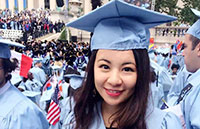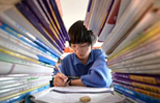Robot aims for first-class Chinese universities in 2017
By Yao Yao (chinadaily.com.cn) Updated: 2016-05-09 10:15
|
 |
|
An interactive robot named Jiajia, who looks very much like a real woman, is unveiled by the University of Science and Techonology of China in Hefei, capital of East China's Anhui province, April 15, 2016. [Photo/Xinhua] |
A Chinese robot aims to get enrolled in first-class Chinese universities in 2017, and then try to get into prestigious and comparatively more difficult Peking or Tsinghua university in 2020 after beating 12th graders.
The robot will sit three exams: math, Chinese, and a comprehensive test of liberal arts, which includes history, politics and geography, said Lin Hui, CEO of an artificial intelligence company in Chengdu. The company won the bid for the artificial intelligence program on the robot's math test held by the Ministry of Science and Technology in 2015.
Like the other examinees, the robot will have to finish the tests in designated time. But what will be unusual is that instead of 30 students taking the exam together, the robot will take its exams in a closed room without anyone else present, except for proctors and a notary.
According to Lin, the robot will be linked to a printer before every exam, and the electronic examination paper will be fed into the robot's program at the start of the examination. The robot will be totally disconnected from the internet and will solve the problems with its artificial intelligence program. Finally the answers will be outputted through the printer.
It's believed that Chinese and a comprehensive test of liberal arts, rather than math, will pose the biggest challenge since questions in math are objective with specific answers, while in the other test subjects there are some subjective questions, such as the reading comprehension and essay-writing.
Lin said the robot writing technique nowadays has matured. With key information words, a robot can write an economic news report that is as good as written by a human, Li said.
The robot is actually a touchstone for artificial intelligence development and the key technology of it lies in understanding language and reasoning, according to Fu Hongguang, who is in charge of the research and development of the artificial intelligence program required in the math test.
While the robot is reportedly trying to qualify for admission to Peking University or Tsinghua University in 2020, its counterpart in Japan is eyeing Tokyo University in 2020.
The robot is just one example of the boom in artificial intelligence after Google's AlphaGo beat a world-class player in the ancient board game Go in March.
- Air defense zone over South China Sea an option
- Li vows transparent, fair environment for European investors
- China calls on US, Japan to stop twisting the facts
- Two Nansha islands greet their first civil flights
- Flight-tests check routes to Nansha airfields
- Premier to set new course in Mongolia
- Copyright violators to be placed on blacklist
- Car-hailing firm bans mentally ill, criminals from driving
- Calling it quits: Divorce rate jumps 6%
- More rain to create Yangtze flood control pressure









